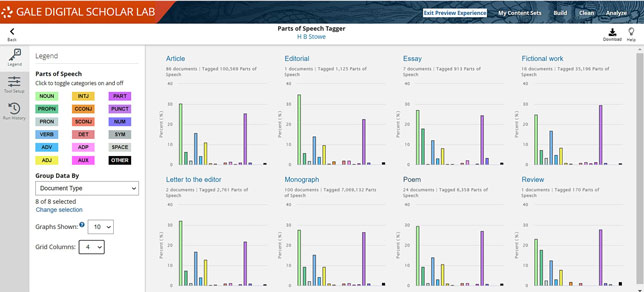Gale Digital Scholar Lab Update Offers Enhanced Analysis Tools

Gale Digital Scholar Lab
Gale, a provider of research and learning resources for libraries and education institutions, has revamped its Gale Digital Scholar Lab platform for digital humanities (DH) researchers. The updates, including a new interface and redesigned analysis tools, aim to help researchers "navigate text and data mining workflows and improve the experience of running analyses and investigating research outcomes," according to a news announcement.
The Lab is a cloud-based research environment that allows users to create custom content sets and then analyze and interrogate the data with built-in text analysis and visualization tools. Among the new features:
- A new user interface brings the user experience in line with the Gale Primary Sources platform of content collections and meets WCAG 2.0 accessibility guidelines.
- Expanded search capabilities, also aligned with Gale Primary Sources, include updated search options as well as an optical character recognition confidence filter.
- Enhanced layouts for the platform's "Build, Clean, Analyze" workflow offer more interactivity within visualizations.
- Redesigned analysis tools include an analysis dashboard that provides an at-a-glance view of researchers' work; streamlined steps for setting up and running new analyses; and the ability to jump from visualization of a content set to inspection at the individual document level.
- An updated Learning Center provides new how-to content, multimedia resources and redesigned sample projects to promote the development of digital literacy.
- Shibboleth authentication allows users to log into the platform using their university credentials.
"We are seeing an emphasis on bringing DH methods into the classroom as well as an increase in DH certificates and minors that focus on data analysis and storytelling using a variety of tools," commented Seth Cayley, vice president of global academic product at Gale, part of the Cengage Group. "Through a robust Learning Center that provides curriculum materials and sample projects, these new enhancements introduce a more unified research experience across Gale Digital Scholar Lab, increasing user confidence and faculty engagement that supports undergraduate and graduate research and teaching."
For more information, visit the Gale site.
About the Author
Rhea Kelly is editor in chief for Campus Technology, THE Journal, and Spaces4Learning. She can be reached at [email protected].